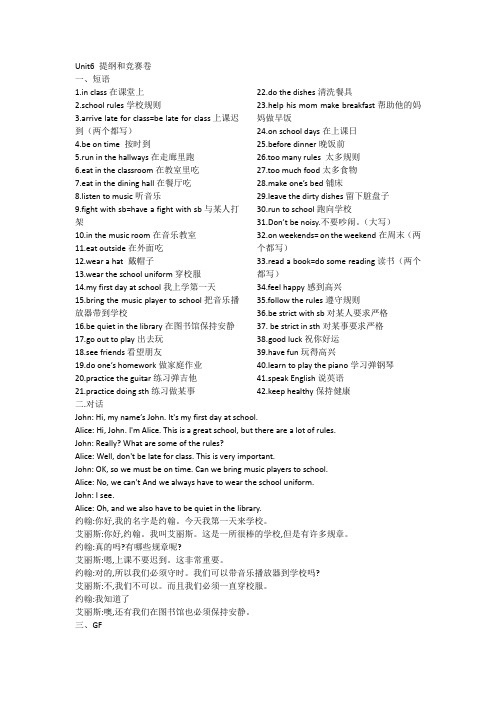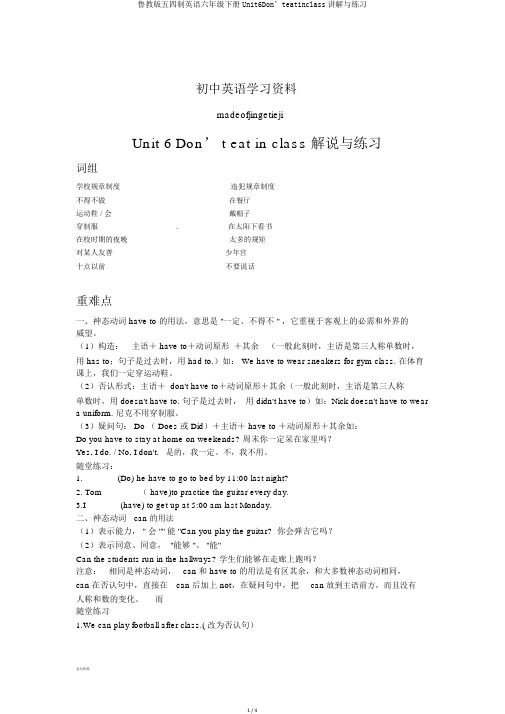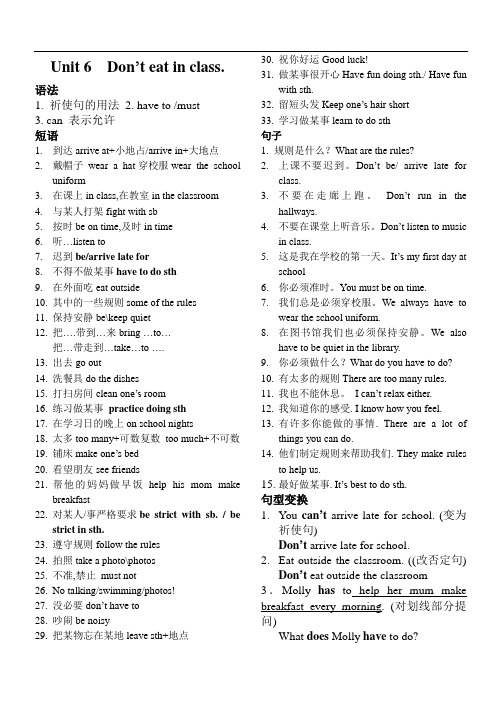鲁教版英语(五四制)六年级下册_Unit6_单元要点梳理总结
鲁教版英语六年级下unit6单元提纲

Unit6 提纲和竞赛卷一、短语1.in class在课堂上2.school rules学校规则3.arrive late for class=be late for class上课迟到(两个都写)4.be on time 按时到5.run in the hallways在走廊里跑6.eat in the classroom在教室里吃7.eat in the dining hall在餐厅吃8.listen to music听音乐9.fight with sb=have a fight with sb与某人打架10.in the music room在音乐教室11.eat outside在外面吃12.wear a hat 戴帽子13.wear the school uniform穿校服14.my first day at school我上学第一天15.bring the music player to school把音乐播放器带到学校16.be quiet in the library在图书馆保持安静17.go out to play出去玩18.see friends看望朋友19.do one’s homework做家庭作业20.practice the guitar练习弹吉他21.practice doing sth练习做某事22.do the dishes清洗餐具23.help his mom make breakfast帮助他的妈妈做早饭24.on school days在上课日25.before dinner晚饭前26.too many rules 太多规则27.too much food太多食物28.make one’s bed铺床29.leave the dirty dishes留下脏盘子30.run to school跑向学校31.Don’t be noisy.不要吵闹。
(大写)32.on weekends= on the weekend在周末(两个都写)33.read a book=do some reading读书(两个都写)34.feel happy感到高兴35.follow the rules遵守规则36.be strict with sb对某人要求严格37. be strict in sth对某事要求严格38.good luck祝你好运39.have fun玩得高兴40.learn to play the piano学习弹钢琴41.speak English说英语42.keep healthy保持健康二.对话John: Hi, my name’s John. It's my firs t day at school.Alice: Hi, John. I'm Alice. This is a great school, but there are a lot of rules. John: Really? What are some of the rules?Alice: Well, don't be late for class. This is very important.John: OK, so we must be on time. Can we bring music players to school. Alice: No, we can't And we always have to wear the school uniform.John: I see.Alice: Oh, and we also have to be quiet in the library.约翰:你好,我的名字是约翰。
鲁教版五四制英语六年级下册Unit6Don’teatinclass讲解与练习

初中英语学习资料madeofjingetiejiUnit 6 Don’ t eat in class解说与练习词组学校规章制度_____________违犯规章制度____________不得不做 ____________在餐厅____________运动鞋 / 会 ____________戴帽子____________穿制服 ____________.在太阳下看书____________在校时期的夜晚____________太多的规矩____________对某人友善 ____________少年宫____________十点以前 ____________不要说话____________重难点一、神态动词 have to 的用法,意思是 "一定、不得不 " ,它重视于客观上的必需和外界的威望。
(1)构造:主语+ have to+动词原形+其余(一般此刻时,主语是第三人称单数时,用 has to;句子是过去时,用 had to.)如: We have to wear sneakers for gym class. 在体育课上,我们一定穿运动鞋。
(2)否认形式:主语+ don't have to+动词原形+其余(一般此刻时,主语是第三人称单数时,用 doesn't have to. 句子是过去时,用 didn't have to)如:Nick doesn't have to wear a uniform. 尼克不用穿制服。
(3)疑问句: Do ( Does 或 Did)+主语+ have to +动词原形+其余如:Do you have to stay at home on weekends? 周末你一定呆在家里吗?Yes, I do. / No, I don't.是的,我一定。
不,我不用。
随堂练习:1._______(Do) he have to go to bed by 11:00 last night?2.Tom _______ ( have)to practice the guitar every day.3.I _______(have) to get up at 5:00 am last Monday.二、神态动词can 的用法(1)表示能力, " 会 "" 能 "Can you play the guitar? 你会弹吉它吗?(2)表示同意、同意, "能够 "、 "能"Can the students run in the hallways? 学生们能够在走廊上跑吗?注意:相同是神态动词,can 和 have to 的用法是有区其余,和大多数神态动词相同,can 在否认句中,直接在can 后加上 not,在疑问句中,把can 放到主语前方,而且没有人称和数的变化。
英语unit6 Section A Period 1 (1a-2d) 六年级英语鲁教版(五四制)下册

Don’t eat in class.
Section A Period 1 (1a-2d)
Learning aims
1. 知识目标:识记 rule, arrive, hall, listen , fight
,sorry ,outside, wear 运用Don’t eat in class. We can’t arrive late for class.
Eat in the dining hall.
A: Can we run in the hallways? B: No, we can’t. We can’t run
in the hallways.
.
Don’t run in the hallways.
A: Can you fight? B: No, We can’t. We can’t fight.
We must be on time.
Can we wear a hat in class? Yes, we can./ No, we can’t.
2. 能力目标:能用本课重点句型表达一些校园规 定,能理解并初步运用祈使句,can 和 must 表述学校的 规章制度
3.情感目标:了解并自觉遵守学校的规章制度。
3.___ listen to music outside
can can’t
4.___ eat in the classroom
can can’t
5.___ eat in the dining hall 6.___ eat outside
7.___ wear a hat 8.___ fight
can can’t can can’t
What can we do at school? What can’t we do at school?
鲁教版六年级英语第六单元复习资料

鲁教版六年级英语第六单元复习资料六年级的同学已经学习完了英语第六单元的全部课文,那么在单元测试之前,同学们应该怎样做好复习准备呢?下面小编整理的鲁教版六年级英语第六单元复习资料,希望对您有用。
鲁教版六年级英语第六单元复习资料第一部分1. 各种文具(自由复习)an English-Chinese dictionary 英汉字典book n.书v. 预订Iwant to book a double room.2. excuse v. 原谅,打扰n. 借口(reason理由)excuse me 打扰了3. thank v. 感谢adj.thankful九上U10 bethankful to对…感激thanks to多亏了thanks for+n./doing为……而感谢4. help v.n. 帮助help sb. (to) do, help with+n. adj. helpful 有帮助的with the help of …在……帮助下,help oneself to随便吃喝,can’t help doing禁不住做某事5.welcome adj.受欢迎的You are welcome. v. 欢迎Welcome to our school.6.watch n.手表复数加es,v. 观看比赛、电视see“看见”表结果,look表动作“看”watch “注视”7. game小游戏,小比赛competition大型比赛竞赛8. 名词所有格1)单个名词的Anna’sbook 安娜的书2)两人共同所有的东西,在最后一个加’s,如:Lucy and Anna’sdesk 两人共用的桌子3)两人分别所有的东西,分别加’s,如:Lucy’s and Anna’s desk 两人各自的桌子4)如果复数名词以s结尾,所有格只加撇,students’ books,在原有9. an IDcard 身份证school ID card 学生证10. ask…for …向…要… answer回答11. lost andfound 失物招领find-found-found找到lose-lost-lost丢失invent v.原来没有的东西发明创造出来inventor发明家invention发明discover v. 原来未发现的东西被找到n. discovery发现find侧重结果“找到”look for侧重动作“寻找”create文学作品创作,创造found-founded-foundedv.成立The PRC(中华人民共和国) wasfounded in 1949.12. a set of keys 一串钥匙tea set茶具(八上U7P51)13. I mustfind it. must是情态动词,“必须,应当,一定”,无时态和人称的变化,后接不带to的动词不定式,表示义务、命令、或必要。
鲁教新版英语六年级下册第六单元知识点

Unit 6 Don’t eat in class.语法1. 祈使句的用法2. have to /must3. can 表示允许短语1.到达arrive at+小地占/arrive in+大地点2.戴帽子wear a hat穿校服wear the schooluniform3.在课上in class,在教室in the classroom4.与某人打架fight with sb5.按时be on time,及时in time6.听…listen to7.迟到be/arrive late for8.不得不做某事have to do sth9.在外面吃eat outside10.其中的一些规则some of the rules11.保持安静be\keep quiet12.把….带到…来bring …to…把…带走到…take…to ….13.出去go out14.洗餐具do the dishes15.打扫房间clean one’s room16.练习做某事practice doing sth17.在学习日的晚上on school nights18.太多too many+可数复数too much+不可数19.铺床make one’s bed20.看望朋友see friends21.帮他的妈妈做早饭help his mom makebreakfast22.对某人/事严格要求be strict with sb. / bestrict in sth.23.遵守规则follow the rules24.拍照take a photo\photos25.不准,禁止must not26.No talking/swimming/photos!27.没必要don’t have to28.吵闹be noisy29.把某物忘在某地leave sth+地点30.祝你好运Good luck!31.做某事很开心Have fun doing sth./ Have funwith sth.32.留短头发Keep one’s hair short33.学习做某事learn to do sth句子1. 规则是什么?What are the rules?2.上课不要迟到。
(2021年整理)第6-9单元鲁教版六年级下英语重点短语与句型总汇

第6-9单元鲁教版六年级下英语重点短语与句型总汇编辑整理:尊敬的读者朋友们:这里是精品文档编辑中心,本文档内容是由我和我的同事精心编辑整理后发布的,发布之前我们对文中内容进行仔细校对,但是难免会有疏漏的地方,但是任然希望(第6-9单元鲁教版六年级下英语重点短语与句型总汇)的内容能够给您的工作和学习带来便利。
同时也真诚的希望收到您的建议和反馈,这将是我们进步的源泉,前进的动力。
本文可编辑可修改,如果觉得对您有帮助请收藏以便随时查阅,最后祝您生活愉快业绩进步,以下为第6-9单元鲁教版六年级下英语重点短语与句型总汇的全部内容。
六年级下英语6—10单元重点短语与句型Unit 6 Don't eat in class一、重点短语1.in class 在课堂上2.arrive late for class 上课迟到3.on time 准时4.in the hallways 在走廊里5.in the dining hall 在餐厅里6.listen to 听7.at school 在学校8.be late 迟到9.music player 音乐播放器10.bring。
.. to school 把……带到学校来11.have to do 不得不做12.wear a school uniform 穿校服13.go out 外出14.on school nights 在上学期间的晚上15.practice the guitar 练吉他16.do the dishes 清洗餐具17.make breakfast 做早饭18.make one’s bed 整理床铺19.leave sth in。
.. 把...。
丢在....。
..里20.read a book 看书21.think about 考虑22.make rules 制订规章23.follow the rules 遵守规章24.Good luck !祝好运!25.keep sth+ 形容词使..。
鲁教版英语(五四制)六年级下册_Unit6_Period2_参考教案

Unit6 Period2 参考教案Step 1 Warm-upWatch a segment of 《逃学威龙》and see what rules they are breaking ? Step 2 PresentationShow a picture of a girl who wants to have a gym class.T: Can we have a gym class like the girl?Ss: …T: Do we have to wear sports shoes in gym classes?Ss: Yes, we do. We have to wear sports shoes in gym classes.Pair work. Practice in pairs like this:“Do we / you have to …?”What else do you have to do at school?We have to wear sports shoes for gym class..What else does he have to do at school?He has to wear uniform.Step 3 Practice1. First finish 3a2. Show Ss some school rules, then let them practice “Do we / you have to …?”School rules:1. Keep tidy and clean.2. Get to school before 7:20.3. Be polite.4. Respect each other.Pair work. Practice in pairs like this:A:What are the school rules, Alex?B:Well, we can’t eat in the classrooms.A:We can’t eat in the classrooms, too. But we can eat in the dinning room.B:We can’t go into the music room without our teacher.A:We can’t, too. And we can’t go into the classroom without teacher.B:Uh-huh, We can. But we can’t listen to music in class.A:Oh, we can’t wear a hat in class.B:Well, we can’t play football at noon.A: What else do you have to do?B: We have to clean the classroom.Step 4 Survey1. Tick the things they have to do at school first, then make a report.2. Make a report: At school, my friends have to …。
六年级英语下册 Unit 6 Don't eat in class Section B(1a2c)教案 鲁教版五四制

Unit 6 Don’t eat in class! Section B (1a-2c)一、教材分析本单元是鲁教版《新目标》的第六单元。
总体而言,这本教材的词汇量很大,有难度,但是,内容新颖,尤其是生动活泼的卡通化的画面,很符合六年级学生的年龄特点和心理特点,其中还囊括了丰富多彩的文化知识,以及合作探究的活动,十分贴近学生的实际生活经验。
本单元的话题Talk about rules.与日常生活密切相关。
作为一名中学生,遵守校纪班规家法,和社会公共场所的规章制度是必须的。
在谈论规则时,一般运用祈使句、情态动词can和have to等。
这是英语新课程标准中规定所必须掌握的内容,是交际英语中必不可少的项目。
因此,本单元对于提升学生的学习兴趣和提高学生的听、说、读、写能力都有很大的帮助。
二、教学目标I.知识目标:1、学习谈论家规。
2、掌握句型:“ I must…” , “I have to…”,“I can /can’t…”3、能听懂有关谈论规则的对话并进行自由交际。
II.能力目标:(1)培养学生的能力在文中用词的能力。
(2)提高学生听说读写技能III.情感态度价值观目标:(1) 通过合作与竞赛等小组活动形式,,增强学生的集体荣誉感,培养学生的合作意识和竞争意识。
(2) 通过对规章制度的学习与讨论,教育学生从小规范自己的行为。
三、教学重难点(1)掌握句子结构"我不得不......","能/ 不能......".(2)祈使句肯定形式与否定形式的运用。
(3)正确、流利说明一些地方的规则。
四、教学策略方法(1)直观教学法:充分利用图片与实例,创设真实的情景,引起学生学习兴趣。
(2)听说教学法:以听、说、读、写、练为主,通过对本课重点句型的学习培养学生听力、口语以及书面语的能力。
(3)任务型教学法:设计各种活动如结对活动、小组合作,促使学生为用而学,增强集体荣誉感。
五、教学过程Step 1 Warming-up and revisionSing some English songs.Greet the class as usual.T: Good morning/afternoon!How are you?Wh at’s the date today?What day is it today?What’s the weather like today?Are you happy?Today I bring some exciting and interesting videos to you!Before enjoying them, I will give you some questions:(1).What are the people in the videos doing?(2).Are they good students?(3).What rules do they break?Try to find the answers to these questions when you watch the videos.(Play the three short videos for the students.)T: Now can you tell me the answers to these questions?(Ask some students to answer these questions.)T: Well done! You all know the rules of the school very well! So you are all good students! But can you tell me the other rules of the school?(Ask some students to talk about the other rules of the school.)Step 2 PresentationT: OK! Just now we talk about the rules of the school. Do you know the rules ofother places? In which places we have to obey the rules? (Libraries, dining rooms, dormitories, our houses, etc.)T: Yes. In our houses, we also have rules. So everyone in your house have to obeythe rules of your house. Now, open your books! There are some house rules. First,look at the pictures; tell me what you see in each picture, using whatever wordsyou can. (If necessary, supply the words or sentences and ask the class to repeat.Say a sentence or two about each picture. What's he doing? He's doing homework. Repeat.He's doing homework. The class repeats.)T: Now look at the rules under the pictures. Read after me! (Point out the list ofrules. Read each rule and ask students to repeat. ) T: OK! Now match each rule with one of the pictures. Write the letter of each pictureon the blank line in front of one of the rules. For example, Picture a matches withthe second rule. (Point out the sample answer.) Do as the sample do. (Give the Ss1 minute to prepare)Check the answers.Step 3 Listening PracticeWork on 2a(完成P74 - 2a)T: Great! I have two friends. Their names are Emily and Dave. First, let’s knowthem. Look at the two photos. The girl is called Emily and the boy is called Dave.They are talking about the rules of the house. Listen to a conversation between them.I will play the tape for two times. For the first time, only listen carefully totheir questions and answers. For the second time, number the rules in the order Daveand Emily talk about them. The first rule Emily talks about is don’t go out on school nights. The number 1 has already been in the blank in front of that rule. Write inthe numbers 1-4 as Dave and Emily talk about each rule while you are listening. (Playthe tape two times for the Ss. Then check the answer.)Work on 2b(完成P74- 2b)T: This time, please put a checkmark under Emily or Dave after each rule that Davehas at his house and each rule that Emily has at her house. (Point out the sample answer).Play the tape again and have students make checkmarks (√). You may wish to playthe tape more than once at this point. Correct the answers.Step 4 Talk.T: Good job! Just now we have known the rules of my two friends Emily and Dave. Now who would like to talk about the rules of their houses? (Give the Ss some sentence structures to help them. Like “In Emily/Dave’s house, we have to…/ we can’t…) Give them 1 minute to prepare. Then ask some Ss to talk.2. Pair worksT: Excellent! We have talked about the rules of Emily’s and Dave’s houses. Now I want to know about the rules in your house. What can and can't you do in your house? What do you have to do? Work with your partner. UsingA: Do you have family rules?B: Yes, I do.A: What do you have to do?B: I have to…(Give them 3 minutes to prepare)As the students talk, move around the room, monitoring conversations and offering language support as needed.Have some pairs of students present their conversations to the class.Step 5 Class Survey1. Make a list of the rules at your houses.T: OK! There are so many rules in your houses! Now make a list of the rules at your houses. You can use Zhao Pel's list of rules as a model.Give the Ss some minutes to write. And then have some students read their lists to the class. Make language corrections as needed.2. Make a surveyFirst, point out the sample question and answer in the picture in the book. Ask two students to read it to the class.Ask students to move around the classroom and ask each other question. Their job is to find other students who have the same rules.When student A finds another student with the same rule, student A writes the other student's name next to that rule on his or her list.Then do a quick check to see which rules are most common.(Alternative: If you would prefer not to have your students move around the room, you can ask them to do this activity in groups of four. They survey the other members of their group to find who has the same rules as they do.)Step 6 HomeworkDo the exercises in the exercise books.Write a short composition which is about the rules at their houses.六、板书Unit 6 Don’t eat in classhave to的用法-- A: Do you have to…? (wear a uniform at school,wear sports shoes for gym class)-- B: Yes, we do./ No, we don’t.-- A: What else do you have to do?-- B: We have to clean the classroom.七、反思本节课根据新课标提出的以学生为本的教学理念,注重学生兴趣和实际应用英语能力的培养,把掌握知识,形成技能,发展能力与培养学生个性健康发展结合起来,努力创设真实情境,在真实的情境中培养学生英语学习的积极情感和语言实践能力、文化意识,为学生的可持续发展打下坚实基础。
- 1、下载文档前请自行甄别文档内容的完整性,平台不提供额外的编辑、内容补充、找答案等附加服务。
- 2、"仅部分预览"的文档,不可在线预览部分如存在完整性等问题,可反馈申请退款(可完整预览的文档不适用该条件!)。
- 3、如文档侵犯您的权益,请联系客服反馈,我们会尽快为您处理(人工客服工作时间:9:00-18:30)。
Unit6 单元要点梳理总结重点短语1.在课堂上in class2. 上课迟到arrive late for class3.准时be on time4.在走廊里in the hallways5.在餐厅in the dining hall6.听音乐listen to music7.与某人打架fight with sb. 8.戴帽子wear a hat9.许多规则 a lot of rules 10.因……而迟到be la te for …11.把……带到……bring sth. to … 12.穿校服wear school uniforms 13.不得不安静have to be quiet 14.看朋友see friends15.练习吉他practice the guitar 16.洗盘子do the dishes17. 帮助妈妈做早饭help mom makebreakfast18.打扫他的房间clean his room19.太多……(+可数名词)too many 20.太多……(+不可数名词)too much21. 太……(+形容词)much too 22.整理你的床铺make your bed23.早饭后after breakfast 24.感觉好feel well25.告诉(叫)某人做某事tell sb. to do sth. 26.考虑think about27.对某人严格要求be strict with sb. 28.对某事要求严格be strict in sth.29.记得去做某事remember to do sth. 30.遵守规则follow the rules 31.制定规则make the rules 31.做某事有趣have fun doing重点句型1.不要在课堂上吃东西。
Don’t eat in class.2.不准上课迟到,务必守时。
Don't arrive late for class. You must be on time.3.不准在走廊内乱跑。
Don’t run is the hallways.4.不准在教室里吃东西,务必在餐厅里吃东西。
Don’t eat in the classroom. You must in the dining hall.5.不准在课堂上听音乐。
Don’t listen to music in class.6.我们不可以在走廊里听音乐,但在外面可以听。
We can’t listen to music in the hallways, but we can listen to it outside.7.我们可以把音乐播放器带到学校吗?Can we bring music players to school?8.我们总是要穿着校服。
We always have to wear the school uniform.9.别把脏碗留在厨房里。
Don’t leave the dirty dishes in the kitchen!1.重要的adj. _________→__________n.2.带来v. _____→____(反义词)带走;拿走安静的adj. _________→__________adv.碟,盘n. _________→__________(pl.)碟,盘吵闹的adj. _________→__________n.放松,休息v. _________→______ adj.轻松的感觉,觉得v. ______→________n.感觉运气n. ____→_____adj.好运的→_______(反义词)不幸的→______adv.幸运地1.Don’t arrive late for class.arrive作不及物动词,表示“到达”,接宾语时,需要加上介词in或者at。
When did you arrive?We are arriving at the station at two o’clock.【拓展】reach表示“到达”时,是及物动词,后面直接接表示地点的名词作宾语。
另外两个表示“到达”的动词(get和arrive)都是不及物动词,get to+地点;arrive in/at+地点。
After a long way, they reached/got to/arrived at the top of the mountain finally.2.You must be on time.on time用作固定短语,表示“准时、按时”,in time表示“及时”。
The train arrives on time.The ambulance(救护车)arrives in time.3.Don’t listen to music in class.listen用作不及物动词,表示听的动作,后接宾语时,需要加上介词to,hear强调听的结果,表示“听到”。
This girl likes to listen to music.Can you hear anything?4.Don’t fight.fight此处用作动词,意为“打架”,fight with sb.意为“与某人打架”。
Why do you sometimes fight with others?5.listen to music outsideoutside表示“在外边”,反义词为inside“在……里面”。
Don’t stay inside all the time. Let’s go outside to play together.6.wear a hatwear此处用作及物动词,意为“穿、戴”,表示穿着的状态,宾语可以是衣帽或者饰品。
She likes wearing a red coat.The young lady wears a pair of sunglasses.【拓展】辨析wear, put on和dress7.Can we bring music players to school?bring表示“带来”,强调从别的地方带到说话的地方,常与副词here连用;take 表示“带走”,强调从说话的地方带去别的地方,常与副词there连用;carry表示“搬、抬”,没有方向性。
The students brought their homework to school in the morning and take them home after school.8. practice the guitarpractice用作及物动词,表示“练习、训练”,后接名词或者动名词作宾语。
The girl is practicing playing the piano in the room.9. help his mom make breakfast①help sb. with sth. 帮助某人某事Can you help me with my homework?②help sb. (to) do sth. 帮助某人做某事He often helps his mother clean do housework.③with the help of 在……的帮助下With the help of the doctor, the man gets better.10. There are too many rules!too many意为“太多”,用作形容词时,后接可数名词复数。
There are too many students in our school.【拓展】too much, much too和too many辨析11. Don’t leave the dirty dishes in the kitchen!leave此处用作及物动词,意为“留下、剩下”,常用的结构为:leave+宾语+地点状语,表示“把某物忘在某地”。
I left my pen in the bedroom.12. After dinner, I can’t relax either.also, too, as well与either都可以表示“也”,但是用法不同。
13. Parents and schools are sometimes strict, but remember,they make rules to help us.(1) sometimes是频度副词,意为“有时”,相当于at times。
I sometimes play computer games on weekends.【拓展】辨析sometimes, some times, sometime与some time(2)strict用作形容词,意为“严格的、严厉的”,常用的短语为:be strict with sb.“对某人严格要求”。
She is strict with her son.(3)remember的用法①remember to do sth.“记得要去做某事”,强调动作还没有发生。
Remember to close the door when you leave.②remember doing sth.“记得做过某事”,强调动作已经发生。
I remembered meeting him before. But I was not sure where it is.14. ...I have to/must keep my hair short.①keep sth. 保留某物You can keep the book until the next weekend.②keep doing sth. 一直做某事The thief still kept stealing things after he went out of the prison.③keep+adj. 保持……The girl eats a little to keep slim.④keep sb./sth.+adj./介词短语保持某人/某物……We should keep the window open while we are asleep.My mother keeps the vegetables in the fridge.⑤keep sb. doing sth. 保持某人做某事The mother kept the baby crying on the bed.15. ...because I have to learn to play the piano.learn用作及物动词,表示“学习”,后常接名词、代词或者动词不定式作宾语。
